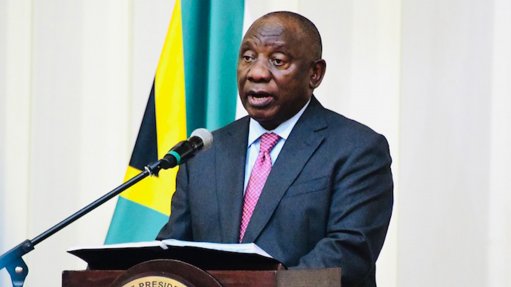
President Cyril Ramaphosa
President Cyril Ramaphosa noted on Monday that with the advent of 24 hour news, the proliferation of social and community media and the speed with which information is disseminated in the digital age, it is nearly impossible for mass atrocities to occur under conditions of secrecy.
In his weekly letter to the nation, Ramaphosa pointed out that several western countries, some of which had a presence in Rwanda in 1994, later said they were not aware of the extent of the killings during the genocide.
“Thirty years later, no country or international body can any longer say ‘we didn’t know’ and use that claim as justification for a failure to act,” he said.
He added that ignorance cannot be claimed about what is happening in Gaza as, unlike in Rwanda in 1994, the atrocities are being televised, written about, tweeted and live-streamed.
Ramaphosa noted that it was now close to six months since Israel unleashed a campaign of violence on the people of Gaza in response to the attack on Israel by Hamas.
More than 32 000 Gazans have been killed subsequently. According to the United Nations (UN) Children’s Fund, about 13 000 of these casualties are children. Civilians, non-combatants, women, persons with disabilities, journalists and aid workers have also been killed.
Late last year, South Africa instituted proceedings against Israel at the International Court of Justice (ICJ) in The Hague for violating its obligations under the Convention on the Prevention and Punishment of the Crime of Genocide, with respect to its actions in Gaza.
“The International Court of Justice, the principal judicial organ of the UN, pronounced on a set of provisional measures that Israel should take to prevent the commission of all acts falling within the scope of the Genocide Convention. The Court directed Israel, among other things, to ensure that its military does not commit such acts, to prevent and punish the direct and public incitement to commit genocide, and to enable the provision of urgently needed basic service and humanitarian assistance to the people of Gaza,” Ramaphosa reminded.
He said in clear defiance of the legally binding order, Israel had intensified its violence against the residents of Gaza.
“These people are now also facing starvation and famine as the delivery of aid continues to be disrupted, including the killing of humanitarian and aid workers,” he noted.
Last week, the ICJ issued additional measures, ordering Israel to take the necessary and effective measures to ensure “unhindered provision at scale” of basic services and humanitarian aid to the people of Gaza.
The Court accepted South Africa’s argument that, contrary to what Israel claimed, the UN agencies were not being assisted to get aid flowing into Gaza.
The court also ordered Israel to “ensure with immediate effect that its military does not commit acts which constitute a violation of any of the rights of the Palestinians in Gaza as a protected group” under the Genocide Convention.
RWANDAN GENOCIDE
Ramaphosa said atrocities, gross human rights violations and genocide should never carry less weight because of the race, ethnicity or religious affiliation of the victims.
“We owe it to the victims of all the world’s genocides to not betray their memories by looking away, by failing to act, or worst of all, by claiming we didn’t know,” he said.
He noted that the Rwandan genocide was one of the darkest chapters in human history and an atrocity that unfolded as the world looked on and failed to act.
He added that there was little intervention from the international community despite the Genocide Convention having been in existence for nearly half a century, in the aftermath of the Second World War.
In spite of this, he said the Rwandan genocide was allowed to happen in the face of “callous indifference” by the international community.
“It was only several decades later that a number of these ‘bystanders to the genocide’ apologised for failing to act as the killings happened. As they were for the families of those who perished in the Rwandan genocide, for today’s genocide victims, apologies are too little, too late,” Ramaphosa stated.